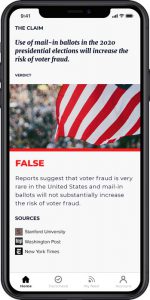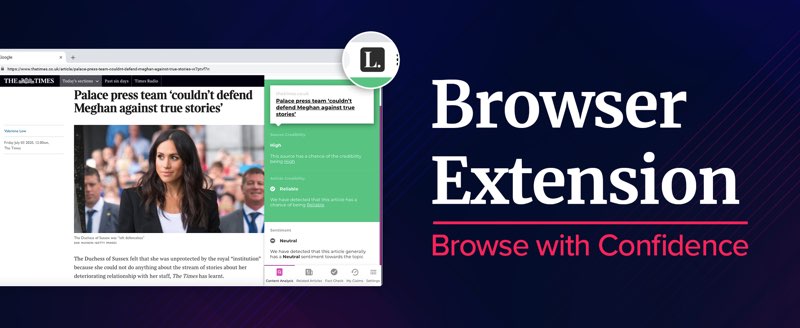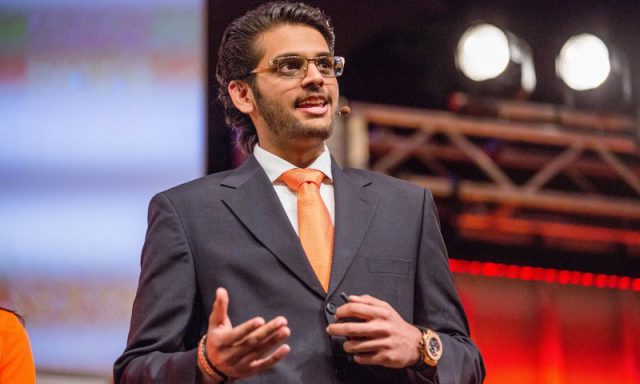The internet is the most powerful tool for sharing information that the world has ever seen. Sadly, it’s also misused to spread false information or ‘fake news’ as President Trump likes to say. Combating lies and hate speech is a big challenge but fortunately there are champions out there who are battling to clean up the chaotic world of the world wide web. Let me introduce Logically.
Logically describes itself as a diverse team of data scientists, writers, fact-checkers, investigators, and developers that use Extended Intelligence to address the structural challenges of the digital information age, unregulated platforms, and put a stop to ‘fake news’. The firm has released an app which aims to help reduce information overload and reduce the tendency of readers to get stuck in echo chambers which only ever reinforce currently held beliefs and views.
The truth is out there
Global Indian Stories was fortunate enough to get some one-on-one time with Lyric Jain, Logically’s CEO, at a time where the upcoming U.S. election is providing an abundance of content that needs fact checking. Lyric is a serial entrepreneur and engineer who founded Logically in 2017, after observing the breakdown in public discourse during the 2016 U.S. presidential election and the Brexit referendum in the UK.

“The aim of the app is to provide individuals more confidence around their decision making, both day-to-day and when it comes to these big democratic events,” explains Lyric. “We try to serve that both through the news side of our app as well as the fact checking side, because the degree of disinformation and misinformation in the U.S. over the last few months has been incredible. It’s only going to increase until election day and likely to continue a month or two after the election.”
The Logically app is aimed at providing voters a useful tool to pick their way through the mire of misleading news and propaganda. Lyric reports that they see a great amount of usage, particularly of their ‘live fact checking’ feature, when it comes to events like the Presidential debates. “Hopefully we’ll extend it to other critical events in the future,” he says.
The Indian election was another time where the amount of misinformation was staggering. “There were 130,000 unreliable articles and 40,000 that contained outright falsehoods. The sheer scale of it surprised us,” says Lyric. “A lot of co-ordinated websites were launched to suck people in with click-bait, sensationalist content either to monetise that via adverts or to change voters’ minds.”
Increasing demand
Even trusted organisations can make mistakes but it’s the prevalence of sites set up for malicious intent or very specific motivations. “Back in 2012 we all thought that social media was going to be this great tool for democracy. It was the Arab Spring which social media played a huge role in and everyone was singing its praises. But four or five years later, things changed quite drastically,” warns Lyric. “I think it’s improved the accessibility to information for individuals but it’s also allowed a wild variety of content, from the most nuanced of analyses to extremist views. People can find community in fringe positions which clearly has huge risks.” He gives the example of the disinformation surrounding vaccines that is likely to rear its ugly head when a coronavirus vaccine is found.

One of the key benefits of technology is its ability to automate tasks, but this could cause problems with fake news being spread by bots far beyond what people alone could do. Can Logically and others keep up with this? “I think we don’t have a choice,” says Lyric, “I think some organisations have tried to keep up with it, for example the big social media platforms. But I think it requires more organisations to play a more critical role. Governments will need to be a stakeholder in this too. I think we can scale up but it will require alignment with policies and regulations.” It will also require firms like Logically to be ready with solutions to tackle the problem.
Family shapes us
Logically was awarded ‘New Asian Business of the Year’ in July 2018. “That was quite a surprise,” admits Lyric, “it was less than a year into incorporation. I think it was the first award that we were ever considered for so that was a proud moment. We were only 6 people at that stage, we’re just over 100 now.”

So, has the entrepreneurial Indian trait been the driving force for his success? “I often declare to people that I moved to the UK when I was 12 and they say that I don’t really have an Indian accent,” he explains. He thinks it’s more his family, rather than his Indianness that has impacted the kind of person that he is, and led him to being the founder and CEO of Logically. “We are fairly untraditional when it comes to startups, we don’t follow the typical rules in the startup playbook of how you should go about your early years. We’ve been more focussed on just doing the work than startups typically are.” He says that a lot of that probably comes from family and maybe also from his Indian heritage.
With the U.S. election coming up, Lyric and his colleagues are certainly going to be kept very busy, combating all the inaccurate claims and fake news that will be commonplace across the internet. One thing is certain, this is just the beginning in the battle against misinformation and it’s heartening to know that there are firms like Logically who are ready to fight on our behalf.
Download the app or visit the Logically website for more information about their quest to tackle fake news and misinformation.
Jonathan has a varied history, having written for publications such as Asian Woman but also technical magazines such as Networking+. He also has a background in IT so he's been instrumental in the technical side of getting Global Indian Stories launched. As co-founder, he also keeps writing, sub-editing, and handling the social media.


![Powerful Pride documentary Legendary Children [All Of Them Queer] streaming very soon](https://globalindianstories.org/wp-content/uploads/2025/06/Legendary-streaming-release-featured-238x178.jpg)



![Powerful Pride documentary Legendary Children [All Of Them Queer] streaming very soon](https://globalindianstories.org/wp-content/uploads/2025/06/Legendary-streaming-release-featured-100x75.jpg)

